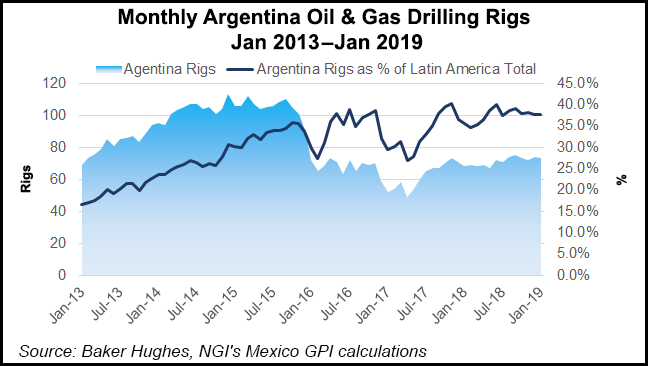E&P | NGI The Weekly Gas Market Report
Argentina, Chile Sign New Seasonal Natural Gas Flow Agreements With Full-Year Flow Starting in 2021
Argentina will this year again send natural gas to Chile from September to May, 2020, Chile’s energy minister Susana Jimenez said Wednesday; but by 2021, natural gas from Argentina will flow to its neighbor throughout the entire year, she said.

Two producers — Argentine state energy company, YPF SA, which is the biggest producer of natural gas in the country, and the local subsidiary of France’s Total SA — were mentioned as being involved in the new “non-interumptimble” shipping agreements to Chile.
The announcement follows last year’s resumption of natural gas exports from Argentina to Chile, after more than a decade hiatus, backed by surging production principally from the prospective Vaca Muerta deposit in Western Argentina, which borders Chile.
New export agreements will be key to the continued rapid development of the world’s second largest shale gas resource, according to Argentina’s energy secretary, Gustavo Lopetegui.
“Vaca Muerta is now a reality with more than 1,000 wells drilled, more than $4 billion in investment in 2018 and new production records each month,” he said Wednesday at a Vaca Muerta round table with executives, oil unions and provincial and national government officials.
But, he added, this is just the start, with only 4% of the formation in development stage, and only about 23% of the total acreage concessioned for exploration and production.
“To keep going on this path of growth we need to continue working at this table with businessmen, the unions and the provincial government,” he added.
In 2016, there were 143 average monthly well fractures in Vaca Muerta; that number hit 248 in 2017, 402 in 2018, and peaked at 712 in February 2019, he said in a recent presentation.
Shale gas production rose 218% in January compared to January 2018, to 29 million cubic meters per day, or approximately 1 Bcf/d. Overall gas production rose 4% in the same comparison, to 4.56 Bcf/d.
Exports were 222 MMcf/d in February, reaching as high as 321 MMcf/d on some days.
Argentina is also exporting gas to Brazil, and has renegotiated its gas agreement with Bolivia so that it will import less as needs diminish. Plans are also in place for small-scale LNG exports starting later this year, with YPF opting for a ten-year contract on a floating liquefaction unit.
A free market on gas is also starting to develop. In mid-February, the Argentine government held two auctions for firm gas contracts between producers and distribution companies, a first step toward a market-based pricing mechanism. Around 37.8 Bcf of gas was contracted for April to March 2020, worth around $1.8 billion. The average price fetched was $4.56/MMBtu.
Lopetegui said Wednesday that Department of Energy Secretary Rick Perry was set to travel to Argentina soon with a team that would include members of service companies to see how they could further U.S. participation in Neuquén province, where Vaca Muerta is located.
There are currently 18 upstream companies working in Vaca Muerta – including BP plc, Chevron Corp., ExxonMobil Corp., Royal Dutch Shell plc, Equinor ASA, Petroliam Nasional Berhad, i.e. Petronas, and Qatar Petroleum, the No. 1 natural gas exporter in the world — but more competition is needed to bring down costs and improve efficiency, according to Lopetegui.
The principal bottleneck remains infrastructure to get the gas to where it is needed. With this in mind, earlier this month, the energy secretariat announced an August tender for the construction of a new $1.5 billion gas pipeline to connect Vaca Muerta and Buenos Aires, with potential additional extensions to existing pipelines.
All of this of course, hinges on the above-ground realities of Argentina. On March 10, Neuquén held gubernatorial and legislative elections. The pro-oil governor, Omar Gutiérrez, won re-election, meaning policies favorable to the development of Vaca Muerta will remain in place for the time being.
But Argentina also has a general election later this year. Current president Maurcio Macri, who has done much to reverse the fortunes of the energy sector, will face an uphill battle to win a second term as the country fights soaring inflation, a badly wounded currency and a recession that could see GDP fall by as much as 6% in 2019.
© 2024 Natural Gas Intelligence. All rights reserved.
ISSN © 2577-9966 | ISSN © 1532-1266 |
